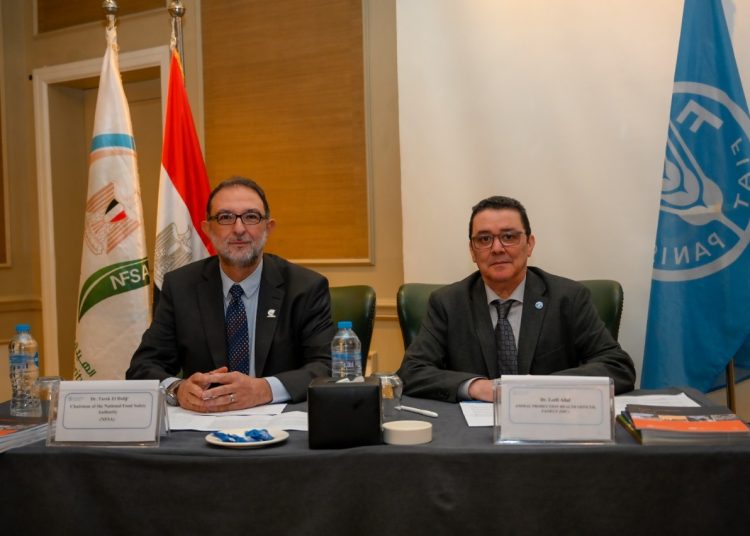By Ibrahim Mohamed
The workshop on the project document “Strengthening food control, phytosanitary capacity, and governance” was launched in Cairo in co-operation with the Food and Agriculture Organisation of the United Nations (FAO).
The workshop aims to begin evaluating Egypt’s national food control system using the FAO/WHO food control system assessment tool, with the participation of a large number of decision-makers and officials.
This document, signed with FAO in Egypt during the First African Foundation Forum of Senior Food Regulators (AFRAF) held in Egypt last October, aims to provide technical assistance to a number of member states of the East and South African Community (COMESA) to strengthen its capacity for food control systems as well as phytosanitary systems, using internationally recognised tools and methodologies. Thereby contributing to the promotion and development of food safety policies in African countries, as well as the governance of sanitary and phytosanitary systems at the regional and national levels.
In his speech at the opening session, Dr Tareq EL-HOUBY, Chairman of the National Food Safety Authority, expressed sincere thanks and appreciation to FAO, in particular the Regional Office for the Near East and North Africa in Cairo.
The partnership with FAO is part of Egypt’s vision of building a strong, co-operative, and sustainable food and agricultural production sector across the continent.
This trend came in line with Egypt’s Vision for Sustainable Development 2030 and the directives of political leadership to adopt new technological approaches to the food and agricultural production sector based on the development of manufacturing and storage capacities, adapted to what reality imposes and to the needs of Egypt and the African continent.
In addition to strengthening the sector’s capacity to become more adapted to climate change and the need to improve access to water resources in order to overcome the challenges facing food security, not just for Egypt but for the entire African continent.
NFSA prepared the first strategic plan for the period 2023–2026, in line with Egypt’s Plan for Sustainable Development 2030, which ensured that all have access to adequate, safe, nutritious, and sustainable food, as well as the imperative to eradicate hunger and achieve food security for Egyptian citizens.
This is also in line with Africa’s Agenda 2063, “Africa we want” to eliminate all forms of food insecurity and hunger.
EL-HOUBY said: Our vision is for the National Food Safety Authority to play a national leadership role in Africa and the Middle East as a regulatory body on food safety that contributes effectively to the protection of consumer health and provides an environment conducive to the development of the Egyptian food and agricultural sector.
Also, relying on science, data, and evidence with the application of best food regulatory practices, accompanied by decisions that help protect consumers’ health and create a fair environment for food trade.
NFSA reaffirmed its commitment to work jointly as an actor in FAO’s evaluation process, with a view to meeting international standards, EL-HOUBY added.
For his part, Head of FAO’s Emergency Centre for Transboundary Animal Diseases (ECTAD) LotfiAllal said this project, signed by the Egyptian Government with FAO, came within the health and phytosanitary policy framework for Africa and was developed by the African Union to boost trade among African Union member states.
Although Egypt’s request to evaluate its national food control system to develop strategies to improve the public health and economic development of the country was submitted by the Ministry of Agriculture, FAO was committed to supporting Egypt in the entire evaluation process until the results were formulated, in close co-operation with all ministries, national institutions, and other national partners.
It is worth mentioning that the workshop aims to ensure the full participation of all stakeholders in the evaluation process, as well as training the officials of each competent authority involved in food control on the evaluation and data collection process. The workshop lasts for five days, from February 25–29.






Discussion about this post